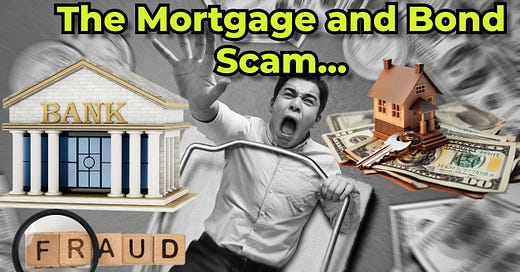The Mortgage and Bond Scam…Making Money Off of You!
I was doing research this week to prepare for an upcoming interview on the U.S. Corporation and the consequences that come with that. While reading a section of the book, Meet Your Strawman and Whatever You Want to Know, I came across a section on mortgages. The writer told a story about a gentleman named, Jerome Daly of Minnesota (1969), he went to court because he was going to lose his house in a foreclosure case brought by the bank that supposedly gave him a home loan.
The argument he gave in his defense was, “…that any mortgage contract required that both parties (he and the bank) put up a legitimate form of property for the exchange.”
Daly told the court that the money the bank said they used for his loan was never the property of the bank to begin with. He explained that because the money was not created until he (Mr. Daly) actually signed the loan agreement, that the money could not have in fact been the property of the bank. “That is, the money does not come out of the bank’s existing assets as the bank is simply inventing it, and in reality the bank is putting up nothing of its own, except for a fictional liability on paper.”
Daly’s point was that once he signed the loan agreement, then the money, like magic—poof—came into existence. In reality, the bank never had to take any money out of its own account.
The court case proceeded and the President of the bank was called to the stand. According to the writer, the bank President “admitted that the bank in combination with ‘The Federal Reserve Bank’, created the entire amount of the loan in ‘credit’ in its own books by means of a bookkeeping entry, the money and credit coming into existence when they created it.” The bank President also said that there is no law that gives him the right to do this. What? Did he really admit this? Yes.
The jury used this information to come to their decision; because there “had been no lawful consideration put forward by the bank”—the jury decided in favor of Mr. Daly and not only did he get to keep his home, he got to keep it free and clear of the debt.
The book expounded on the fact of how the banks use this process to write mortgages even today, and it all hinges on our signature.
We're under the belief that when we go to the bank for a loan, they take it out of their big bag of money-- out of their assets – and hand it over to us and they say, “Okay, here's the $100,000 you want for the home.”
Well, that's not what happens. What I've been finding out is what they're doing is having you sign the agreement, and as soon as you put your signature on that piece of paper it is your signature that makes that piece of paper a “valuable security”—your signature gives the deal value.
Think about the main elements of data they collect on the mortgage application: your name, the amount you want for the loan, your social security number, and then your signature.
Once you strike your signature on that paper and hand it to the bank, they look at that paper as a valuable money instrument. According to the book, “The ‘signature’ on that signed application makes it a valuable piece of paper which the bank can deposit in its accounts as a credit to the bank for the amount of the loan. The bank could just keep that application form and stay ahead by $100,000 or whatever, but they want more, much more. The want the borrower to pay them the same amount again, funding it by years of labor, and not only the amount of the supposed ‘loan’ but significant extra amount in interest as well.”
They got the signed mortgage instrument for the value that it was written for (say $100,000), plus you are going to pay them another $100,000 plus interest. Remember they NEVER gave you $100,000 out of their own pocket. (Your signature created the $100,000 for them out of thin air!)
Even if you stop making payments and go into foreclosure they never lose. They got the original amount of the loan as a credit in their assets bag (from the signed mortgage application), plus any payments and interest you’ve paid until the time of foreclosure, and then they get to keep the property in foreclosure—and the best part is they never spent a cent of their own money.
The entire mortgage process seems to be built on a sleight of hand trick! This is just part of the explanation of their insidious deception. It can get confusing.
You may be wondering, “What is it that makes your signature so valuable?”
The answer is your strawman. I highly recommend reading this book if you don’t know what a “strawman” is, but to try and answer the question about your “valuable” signature, there is an account tied to your social security number and your birth certificate through The Federal Reserve Bank. When you were born, your birth certificate created a fictitious legal entity with the same name as you, but it is not you. They turned your birth certificate into a security instrument. Your signature is linked to the strawman account via the security instrument that gives it value.
It is way too complicated to explain in this article, but this excerpt from the book essentially spells out why the bank is so interested in your signature and the mortgage loan application which is essentially a promissory note.
“…the promissory note that is linked to the mortgage contract and signed by the buyer is a mortgage-backed security.” The bank “will then agree to pay the Federal Reserve Bank a certain percentage of interest over “prime.” Thus the buyer’s loan package goes to the Federal Reserve Bank which “credits” Magic Bank (your bank) with the full amount of credit which is the total amount of the money the bank is entitled to receive after 25 years which is the amount of the principal plus all interest payments the buyer has promised to pay to the bank for 25 years or more which is usually three times the amount of the money promised by the bank to the buyer…the bank just enriched itself and got paid in advance, without using or risking its own money.”
By now your head may be spinning, but here is the part that bothers me most: this is never disclosed to us. And I think that's a problem. And I think this is why Mr. Daly won his case.
When a contract is put together and two or more parties sign, they know what each other's end of the deal should be when they agree to a contract.
What we're talking about here is we're signing documents thinking that that we're signing for one thing, but we don't know the entire backstory of what we're really signing for. I believe this, in and of itself, makes these contracts null and void because we're not a party to what's really going on in the background. They do not tell us everything.
I highly recommend reading this book to open your eyes. My next interview guest is going to discuss more about what's going on in our name that we don’t know about—stay tuned!
Sources:
Meet Your Strawman Book:
https://www.amazon.com/Meet-Your-Strawman-Whatever-Want/dp/1492877670
Visit Truth Seekers Radio Show:
https://truthseekersradioshow.com/
#MortgageFraud #BankFraud #UCC #RealEstate #PropertyRights






